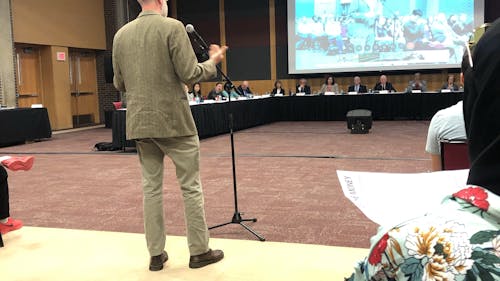Students, professors give their opinions on tuition at Rutgers Board meeting

The Rutgers Board of Governors held its annual Open Hearing on the University’s Tuition, Fees, Housing and Dining Charges for 2019-2020 yesterday, sharing details on this past year’s finances and listening to concerns from students and faculty members on tuition.
Kathy Dettloff, vice president of Finance, began the meeting by giving an overview of Rutgers’ revenue and expense budgets. Out of the University’s $4.4 billion revenue for fiscal year 2018-2019, 36% came from student tuition and fees and auxiliary enterprise (housing and dining services), and 20% came from the state, she said.
“It’s interesting to note that 10 years ago, state support made up 26.5% of our budget,” Dettloff said.
Another 20% of revenue came from patient care and 13% came from grants and contracts, she said.
The University is committed to access to affordability for its students as much as possible, so it is important to invest in resources in education, research and other services, Dettloff said.
In terms of University expenses for last year, 65% went toward salary and benefits, 9% went to scholarships and fellowships for students and the remaining 26% covered the remaining non-compensation costs such as supplies and debt services, Dettloff said.
The average annual increase in tuition and fees over the past five years for all three campuses was 2.1%, which ranks in the middle ground among comparative Association of American Universities' (AAU) public universities nationwide and near the bottom among New Jersey senior public institutions, Dettloff said. Yet the New Brunswick campus’ student tuition and fees rank third highest among the same New Jersey public institutions.
"Tuition increases over the past five years averaged 2.1%, the lowest in recent history at Rutgers and in the state. The University will continue to work to keep tuition increases at a minimum while meeting our budget responsibilities. The University budget, including tuition and fees, is approved by the Board of Governors in July," said Dory Devlin, senior director of University News and Media Relations, in an email to The Daily Targum.
Rutgers’ unrestricted net position was $615 million, Dettloff said. This is a change from 2017’s unrestricted reserves — $783 million — according to a Rutgers American Association of University Professors and American Federation of Teachers (AAUP-AFT) handout.
“Unrestricted is not the same thing as uncommitted,” Dettloff said. “The University must be prudent in setting aside funds for future critical expenditures.”
Of this net position, 38% are invested in reserves, which are the long-time investments for future needs and initiatives such as a new building. Thirty-two percent are designated funds, which are used to fund things such as financial aid, strategic initiatives, multi-year projects and unexpected expenses, Dettloff said.
“Our settlement, and the settlements which we expect with the other contracts do not impact the Rutgers budget in any significant way. So you have $2.9 billion staff costs, we know that, so 3% of that is $87 million … $40 million is the budget surplus you usually run and $47 million is for money that is thrown in a trash can in Piscataway which is called the Athletics Department," said David Hughes, vice president of the AAUP-AFT, when speaking in front of the board.
Rutgers can therefore afford to freeze or lower tuition and to pay workers a decent wage, Hughes said.
One student said tuition is the primary financial burden for families and urged the Board to consider this when making tuition decisions.
Jeffrey Dowd, a professor in the Department of Sociology, said he teaches a class on social problems, and one of the problems is student debt.
“A question I get all the time from students is: ‘Why does Rutgers keep raising tuition? If everyone realizes this is a problem why do they do this?’ And my conditional answer is, 'because they can',” Dowd said.
The University’s presentation relied on comparing Rutgers’ tuition to other institutions, but the goal should be to make a statement by not raising tuition, Dowd said.
“Just think about it from a marketing perspective, it's more effective than all the billboards we pay for,” he said.



